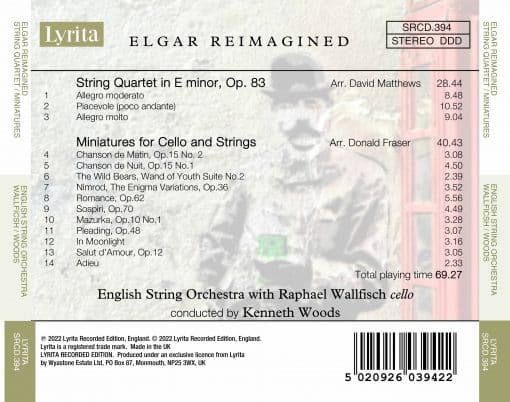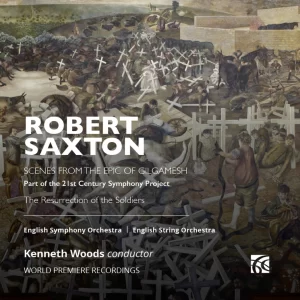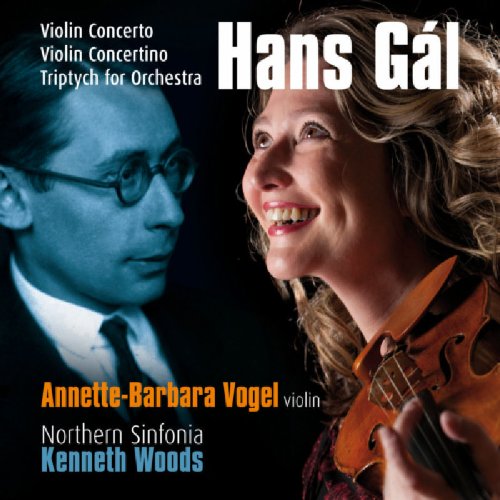Description
Elgar Reimagined
English String Orchestra
Raphael Wallfisch – cello
Kenneth Woods – conductor
£13.50
TRACKS
String Quartet in E minor, Op. 83 arr. David Matthews (28.44)
– 1. Allegro Moderato (8.48)
– 2. Piacevole (poco andante) (10.52)
– 3. Allegro molto (9.04)
Miniatures for Cello and Strings (world premieres) arr. Donald Fraser (40.43)
– 4. Chanson de Matin, Op.15 No.2 (3.08)
– 5. Chanson de Nuit, Op.15 No.1 (4.05)
– 6. The Wild Bears, Wand of Youth Suite No.2 (2.39)
– 7. Nimrod, The Enigma Variations, Op.36 (3.52)
– 8. Romance, Op.62 (5.56)
– 9. Sospiri, Op.70 (4.49)
– 10. Mazurka, Op.10 No.1 (3.28)
– 11. Pleading, Op.48 (3.07)
– 12. In Moonlight (3.16)
– 13. Salut d’Amour, Op.12 (3.05)
– 14. Adieu (2.33)
“When brought to sounding reality with such commitment and enthusiasm as Artistic Director Kenneth Woods and the English Symphony Orchestra on their latest online concert outing, the communicative powers of the Elgar/Matthews score have an absolutely spellbinding effect over the listener… Both wonderfully characterised, the outer movements come off brilliantly with the ESO and Woods. The extended sonorities of the orchestral strings serve Elgar’s writing exceptionally well, thanks to ever beautifully shaped musical phrases and pristine balancing. As a whole, the Elgar/Matthews score is a veritable delight, wholeheartedly recommended for newcomers and seasoned devotees alike.” Jari Kallio – Adventures in Music
“…the undoubted highlight here was Sospiri – the cello’s subsuming of the harp’s crucial contribution just one aspect of an arrangement which presented one of Elgar’s finest inspirations (miniature or otherwise) in a striking new light. Lighter fare next with the robust tread of the Mazurka, proceeded by a rendering of the song Pleading of unforced eloquence. The evergreen In Moonlight (adapted from the overture In the South) responded well to this suitably limpid treatment, as did Salut d’Amour to one that underlined its wholly un-cloying essence. A wistful take on the piano piece Adieu saw this programme to an affecting close.Throughout, the idiomatic feel of Wallfisch’s playing was complemented by that of the ESO under Kenneth Woods, as discreet or understated as the music requited.” Richard Whitehouse – Arcana.FM




Admin –
From Records International
https://www.recordsinternational.com/cd.php?cd=02X043
Elgar’s superb String Quartet is a good deal less well known than it should be, as one of the three major chamber works that he produced, along with the Cello Concerto, in a brief late flowering of his compositional muse, having been all but silenced by depression, illness, and the tragedy of the First World War up to this point, and subsiding into silence thereafter. Matthews has performed a most valuable service by enriching the textures of the work, which is quintessential Elgar; the music didn’t “need” this treatment, but so completely idiomatic is Matthews’ approach that the work now sounds like a fitting companion piece to the Introduction and Allegro or the Serenade for Strings, and deserving of similar popularity. The Quartet is substantial, in three movements, and as well as its obvious relation to the Introduction and Allegro (which Matthews highlights by preserving solo string textures at several points), there are points of contact with the Cello Concerto and fleeting reminiscences of characteristic Elgarian gestures in other works including the symphonies and “Enigma” variations. Fraser’s suite of eleven short pieces arranged for cello and strings is more of a novelty item, but Elgar at his most inconsequential – and none of these pieces is exactly that – still sounds like Elgar, and thus worth listening to. If nothing else it provides an opportunity to hear nicely done transcriptions of little pieces that don’t get many outings, and a useful reserve of Elgar encores for cellists after the aforementioned concerto. The pieces range from attractive standalone “light” miniatures to slightly gratuitous transcriptions of significant works like Nimrod from the Enigma variations, for those of you who like that sort of thing, but nothing is less than warm-hearted and thoroughly enjoyable. Raphael Wallfisch (cello), English String Orchestra; Kenneth Woods.
Admin –
From Arcana FM by Richard Whitehouse
https://arcana.fm/2022/03/05/elgar-reimagined/
Elgar arr. Matthews String Quartet in E minor Op. 83 (1918)
Elgar arr. Fraser Miniatures for Cello and Strings: Chanson de Matin, Op.15 No. 2 (1899). Chanson de Nuit, Op.15 No. 1 (1899). The Wild Bears, Op. 1b No. 6 (1908). Nimrod, Op.36 No. 9 (1899). Romance in D minor, Op.62 (1910). Sospiri, Op.70 (1914). Mazurka, Op.10 No.1 (1899). Pleading, Op.48 (1908). In Moonlight (1904). Salut d’Amour, Op.12 (1888). Adieu (1933)
Raphael Wallfisch (cello), English Symphony Orchestra / Kenneth Woods
Producer Phil Rowlands Engineer Tim Burton
Lyrita SRCD 394 [69’27”]
Recorded 22 September and 9 October 2020 at Wyastone Concert Hall, Monmouth
Written by Richard Whitehouse
What’s the story?
This new release by the English String Orchestra focuses on Elgar, a composer championed by this ensemble throughout its 44 years of existence, whose music is given an appealing and (for the most part) instructive appraisal across the programme of arrangements featured here.
What’s the music like?
The principal work is the String Quartet in E minor, arranged by David Matthews. Second in a wartime triptych of chamber pieces, it is less introspective than the Violin Sonata preceding it but less emotionally charged than the Piano Quintet which came after, while arguably the most finely proportioned – not least in terms of the subtle transformation of thematic elements across and between its movements. In this guise, it follows on from the Serenade then Introduction and Allegro as the hitherto missing large-scale work for string orchestra of Elgar’s high maturity.
Matthews has been mindful to equate the soloistic with the ensemble potential of this music, so the result is neither straightforward transcription nor radical re-conception. The opening Allegro discreetly evokes an autumnal rumination as sets the tone for much of what follows; even finer is the central Piacevole, its main theme suffused with an intensity whose extent is only revealed at the close. If the emotional acuity of the final Allegro is marginally diffused, there is no absence of purposeful intent as the music proceeds to a coda of terse decisiveness.
The remainder of this programme comprises a sequence of Miniatures, arranged for cello and strings by Donald Fraser and played by Raphael Wallfisch. Ostensibly an 11-movement suite, its efficacy in terms of smaller groupings and even individual encores should be self-evident.
Chanson de Matin launches proceedings in mellifluous fashion, and if the cello’s assumption of the melodic line is slightly to the detriment of the original scoring, that could hardly be said of Chanson de Nuit whose sombre contours and inward character are unerringly realized. Nor does The Wild Bears lose out on vivacity, and if the arrangement conjures up Saint-Saëns, this only serves to underline the importance of ‘Second Empire’ French music on Elgar’s thinking. The cello’s dominance in Nimrod rather detracts from the subtlety of this Enigma Variation’s instrumentation – conversely, the Romance brings soloist and strings into even closer accord than the composer’s version with orchestra. The highlight here is Sospiri, which presents one of Elgar’s finest inspirations in a striking new light. Lighter fare comes in the robust tread of the Mazurka, followed by an eloquent take on the song Pleading. In Moonlight (adapted from In the South) responds well to such limpid treatment, as does Salut d’Amour in conveying its essence without cloying. A wistful take on the piano piece Adieu provides an affecting close.
Does it all work?
Very largely. The idiomatic nature of the String Quartet is enhanced by the ESO’s committed playing under Kenneth Woods, a follow-up to their recording of the Piano Quintet in Fraser’s orchestration (Avie), while Raphael Wallfisch’s conviction in the Miniatures is undoubted.
Is it recommended?
Indeed, not least as the quality of the playing is abetted by the naturalness of the sound and informativeness of annotations by Matthews and Woods. Heard together, these two parts of Elgar Reimagined make for desirable listening in this 165th year since the composer’s birth.
Admin –
From MusicWeb International by John Quinn
http://www.musicweb-international.com/classrev/2022/May/Elgar-reimagined-SRCD394.htm
Sir Edward ELGAR (1857-1934)
Elgar Reimagined
String Quartet in E minor, Op 83 (arr. David Matthews) [28:44]
Miniatures for Cello and strings arr. Donald Fraser
Chanson de Matin Op 15 No 2 [3:08]
Chanson de Nuit Op 15 No 1 [4:05]
‘The Wild Bears’ (Wand of Youth Suite No 2) [2:39]
‘Nimrod’ (‘Enigma’ Variations, Op 36) [3:52]
Romance, Op 62 [5:56]
Sospiri, Op 70 [4:49]
Mazurka, Op 10 no 1 [3:28]
Pleading, Op 48 [3:07]
In Moonlight [3:16]
Salut d’Amour, op 12 [3:05]
Adieu [2:33]
Raphael Wallfisch (cello), English Symphony Orchestra / Kenneth Woods
rec. 23 September 2020 (Quartet), 9 October 2020 (Miniatures), Wyastone Concert Hall, Monmouth, UK
LYRITA SRCD 394 [69:27]
During the extended period of Covid restrictions in the UK, Kenneth Woods and the English Symphony Orchestra (or, in this instance, the English String Orchestra) enterprisingly embraced digital technology and performed a good number of concerts online. I covered some of them for Seen and Heard International and found them consistently excellent. One such was a short concert in which they performed David Matthews’ arrangement for string orchestra of Elgar’s String Quartet (review). I presume that the performance included on this CD is the self-same performance. Though the arrangement was premiered back in 2010, I hadn’t heard it before seeing that streamed performance. In fact, David Matthews explains in a booklet note that he orchestrated the slow movement of the Quartet as far back as 2002, expanding it later into an arrangement of the whole work.
The performance I saw online, and which I assume is on this CD, used, by my count, 14 violins, four violas, four cellos and two double basses. David Matthews comments that in a few places he has “thickened” the upper string parts. I think that the use of double basses works very well; it strengthens the bass line to balance the increased number of upper strings but not in such a way that the textures ever sound excessively heavy. At one or two points in the first movement and again towards the end of the second movement Matthews has deliberately reduced the scoring back to the four instruments heard in Elgar’s original.
I very much like the extra tonal richness that we hear in the first movement and I also admire the strong sense of Elgarian style that Kenneth Woods demonstrates. The music-making has excellent energy as the movement progresses and becomes more turbulent. The central movement is marked Piacevole (poco andante) and I think that Woods paces the music in an ideal fashion; he brings out the wistfulness but he also imparts the necessary flow. Towards the end, where Matthews “retreats” to scoring for just four instruments, the contrast between that texture and the sound of the fuller ensemble to which we’ve become accustomed is most effective. The concluding movement is full of drive and vitality; the very vigorous ending comes off particularly well.
I was convinced by David Matthews’ work on the Elgar Quartet the first time I heard it. Re-visiting it now in this excellent audio version has reinforced my admiration. Elgar’s Op 83 is a fine work in its own right but David Matthews has shown it in a new – and faithful – light; thereby, I hope, he has expanded its audience. This arrangement should take its place in the string orchestra repertoire. I commented in my review of the streamed performance that I felt Kenneth Woods had elected to use just the right number of string players. With these forces he demonstrated that Matthews has made the Quartet into a bigger piece but without losing sight of the spirit of the original. I stand by that judgement.
Donald Fraser has developed something of a speciality in reimagining Elgar’s music for different forces. For example, he orchestrated the Piano Quintet a while ago and that arrangement has been recorded by Kenneth Woods and the ESO. I’ve never heard that orchestration, though the CD was reviewed by my MusicWeb International colleague Gwyn Parry-Jones. That same disc included Fraser’s arrangement for chorus and orchestra of the solo song cycle Sea Pictures. There’s a link with Fraser’s version of Sea Pictures and the arrangements of pieces that he’s subsequently made for Raphael Wallfisch. Apparently, in 2019 Wallfisch joined the ESO and Kenneth Woods to give the 100th anniversary performance of the Elgar Cello Concerto under the auspices of the Elgar Society. It was on that occasion that Wallfisch heard the choral version of Sea Pictures and that led him to suggest that Fraser should arrange some shorter Elgar pieces for cello and string orchestra. When I received the disc for review, I assumed that the pieces included here were intended as stand-alone arrangements, perhaps to be used as encores. However, in the booklet Kenneth Woods specifically refers to the pieces as an “eleven-movement suite”. Whether one would wish to hear all of them together in concert I’m not entirely sure.
All of the arrangements are skilfully done and seem to me to be respectful of Elgar’s originals. That said, I think some work better than others. In Chanson de Matin and Chanson de Nuit, the cello has the principal melody and the concept works as a kind of song without words. Romance is Elgar’s short work for bassoon and orchestra with the solo part given to the cello. The only drawback – a slight one in this instance – is that one loses the colours of the non-stringed instruments that Elgar included in his original. The loss of orchestral colour is more grievous in ‘Nimrod’ where I very much missed the wider orchestral palette of Elgar’s original. Despite the skills of the present performers, the main climax sounds somewhat diminished, shorn of brass, woodwind and percussion. In Moonlight is a version of the ‘Canto popolare’ from In the South.
‘The Wild Bears’ has a scurrying cello part with busy string accompaniment. I’m afraid it’s no substitute for the full orchestral version. Rather more successful is the arrangement of Salut d’Amour, which is another example of the solo cello singing out the principal melody.
Raphael Wallfisch is predictably excellent in all these arrangements and he’s very well supported by Kenneth Woods and his string ensemble. As you’ll have gathered, I think these arrangements are a rather mixed bag. Some of them will make charming encores and it’s good that they’ve been recorded in order to widen awareness of them. However, whereas the arrangement of the String Quartet will definitely draw me back – probably quite often – to this CD, Donald Fraser’s arrangements don’t hold the same appeal, though I stress that’s a matter of subjective taste.
I think all these pieces are here receiving their recorded debuts. The present performers do them proud and the recorded sound is excellent.
John Quinn
Information received
I am grateful to our reader, Alan Cook, who has drawn my attention to a previous recording of the Matthews arrangement of the Elgar Quartet. Ben Palmer and the Orchestra of St Paul’s recorded it in 2014 for SOMM; that disc was reviewed by my late colleague, Ian Lace.
Admin –
From Sonograma (original in Catalan)
https://arcana.fm/2022/03/05/elgar-reimagined/
Title : Elgar reimagined
Author: Edward Elgar
Performers: Raphael Wallfisch
English String Orchestra
Conductor: Kenneth Woods
Record label: Lyrita
Edward Elgar, a truly English composer, believed that there is music in the air, that the world is full of music and everyone take what you need.
Conductor Kenneth Woods has recorded at Wyastone Concert Hall the album Elgar reimagined (‘Elgar reimagined’) for the Lyrita label, with a version of the String Quartet in E minor, Op. 83, and a suite of eleven new miniatures for cello and strings arranged respectively by David Matthews and Donald Fraser. The miniatures include Salut d’amour (‘Love Greeting’) and Chanson de matin (‘Morning Song’), but also embrace fragments of larger works, such as ‘Nimrod’ from the Enigma Variations (‘Variations of l’enigma’), and transcriptions of other concert pieces, such as the Romanza , originally for bassoon and symphony orchestra.
This performance by The Elgar Festival resident English String Orchestra features London musician Raphael Wallfisch as cello soloist.
Kenneth Woods’ Good Taste ( see reviews), artistic director of the English Symphony Orchestra, is important, because it brings musicians and listeners closer to aesthetic truth, and, at the same time, broadens the possibility of acquiring the sensitivity for a good performance. In 2002, the slow tempo orchestration of the String Quartet
in E minor premiered at the Deal Festival. The rest of the piece was orchestrated in 2010. The arrangement was commissioned by the John S. Cohen Foundation to the composer and music critic David Matthews, also known for his relationship with Benjamin Britten and the Aldeburgh Festival. On the other hand, in 2019, following the performance of the Cello Concerto
of Elgar for the piece’s centenary, cellist Raphael Wallfisch suggested Donald Fraser orchestrate short pieces by the composer. The result is the eleven pieces presented on this disc.
These commendable versions for orchestra, with special mention for Wallfisch—an artist of great expressiveness—represent a fortunate return to the repertoire of the English composer, of whom Bernard Shaw, music critic and playwright, said: “Edward Elgar composed in a language invented by him and he did not follow or found any school».
Text : Carme Miró